Analysis
 |
TAIWAN: A NEW NATION?by J. Bruce Jacobs, Professor of Asian Languages and Studies, Monash University Bruce.Jacobs@arts.Monash.edu.au |
|
One of the Asian good news stories is Taiwan’s democratisation. Following Japan’s defeat in 1945, Taiwan was transferred to China, then under Chiang Kai-shek and his Nationalist Party (Kuomintang). Even though many Taiwanese welcomed the Chinese, Chiang Kai-shek and his henchmen plundered ‘Treasure Island’ and discriminated against local Taiwanese, viewing them as partially Japanese owing to Japan’s fifty-year colonial rule over the island (1895-1945). The discrimination and prejudice against Taiwanese led to the February 28 1947 uprising and the Chinese killing of 20,000 Taiwanese. Though not publicly discussed until the mid 1990s, the uprising and its repression caused a huge divide between the native Taiwanese and the Chinese mainlanders who came in after 1945. With the rise of the Chinese Communists, the Chiang Kai-shek government fled to Taiwan in late 1949 where they remained protected by the Seventh Fleet of the United States following the start of the Korean War in mid-1950.
Chiang Kai-shek and his son, Chiang Ching-kuo, established a Chinese ‘colonial regime’ on Taiwan. During their rule from 1949 to 1988, ‘mainlanders’, while only fifteen per cent of the population on the island, always held a majority in two key bodies, the cabinet and the Nationalist Party’s Central Standing Committee. No Taiwanese became premier or foreign minister.Only with President Chiang Ching-kuo’s death in 1988, did a Taiwanese, Lee Teng-hui, become president. |
Lee had to work very hard to overcome ‘mainlander’ control. Finally, in 1996, he won the first popular election for president. The key breakthrough took place in 2000 when Chen Shui-bian, the candidate of the then opposition Democratic Progressive Party, defeated the divided Nationalist Party. This led to a peaceful transfer of power, perhaps the most significant indicator of true democracy.President Chen faced many difficulties, including having only a minority of seats in the legislature, a bureaucracy that had become attuned to 55 years of Nationalist rule, and a military whose loyalty to the government—as opposed to the Nationalist Party—was in doubt. In 2004, President Chen won re-election over a unified opposition by a slim margin of 0.228 per cent but has since had to face demonstrations and protests from the former rulers. As part of this democratisation, the self-identification of Taiwanese has changed significantly. In 1992, more than a quarter of the population called themselves ‘Chinese’ while only about one-sixth identified as ‘Taiwanese’. Some forty per cent identified as both ‘Taiwanese and Chinese’. At the end of 2005, the number identifying as ‘Chinese’ had dropped to one-sixteenth while the number of ‘Taiwanese’ is now well over forty per cent and the number who self-describe as ‘both Taiwanese and Chinese’ has remained roughly the same. This reflects a major shift in Taiwan’s culture that resembles a similar modification in Australian culture. Once Australians talked about ‘going home’ to Britain even if they had never been there. Similarly, residents of Taiwan used to talk about a Chinese ‘homeland’. People do not talk like that anymore in either place. In Taiwan, these changes came from the lifting of the Nationalists’ repression of Taiwanese identity and from the hostility of the Chinese Communist regime to Taiwan’s elected governments. The Chinese threats of war have also backfired and consolidated the strong feeling in Taiwan that the island is a separate, sovereign state. |
Links:
|

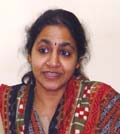 |
THE PENDULUM’S UPWARD SWING: Reassessing Australia’s Relations with Indiaby Shankari Sundararaman changee10@hotmail.com, Associate Professor, Centre for South, Central, Southeast Asian and Southwest Pacific Studies, Jawaharlal Nehru University, New Delhi, India |
|
The pendulum is currently on an upward swing in Australia-India relations. While the law of physics may state otherwise, there is a hope in both governments that this trend is here to stay. Having moved forward from its lowest point in the aftermath of the 1998 Indian nuclear tests, there are several indicators that underpin this optimism. These were evident during Prime Minister Howard’s India visit in March 2006. The first is in the realm of economic ties. The volume of trade between the two countries in 1989-90 stood at roughly AUD$860 million, with Australian exports to India amounting to approximately AUD$590 million. For the year 2004-05 it stood at about AUD$7.5 billion. Since 2000 India has emerged as Australia’s sixth largest market for exports. While Australia still enjoys a trade surplus with India to the tune of AUD$3.6 billion, there is scope for greater two-way trade, with estimates of a rise in the volume of trade to about AUD$16 billion by 2010. During the recent visit six bilateral agreements were signed: an air services agreement; a trade and economic framework; MOUs on customs cooperation, defence cooperation and biotechnology; and a letter of intent to set up a strategic research fund. These agreements target areas of common and emerging interests. In addition, Australia is becoming a favourite destination for Indian students, and India a source of the skilled workers needed in Australia. The second indicator relates to the growing security
ties between the two. Prime Minister Howard’s visit coincided
with the attack on the Sankatmochan temple at Varanasi, a sacred place
of worship for Hindus. In Howard’s response to the incident, he
underlined his tough position on terrorism and mentioned the August
2003 MOU signed between India and Australia on combating terrorism.
Given that Australia and India have common linkages in Southeast Asia,
there is scope for a more regional approach to fighting terrorism. |
The third key issue is the sale of uranium to India. In March 2006, the Indo-US nuclear deal established the separation of India’s civilian and military capabilities. It also assured India’s compliance with international inspections of its civilian facilities used for the peaceful purpose of securing energy requirements. Within this context India had hoped for the sale of uranium from Australia, which has over 40 per cent of the world’s accessible uranium resources. While Australia has publicly stated that India’s non-proliferation record has been impeccable and has supported the Indo-US deal at the Nuclear Suppliers Group (NSG) meeting at Vienna recently, there has been reluctance to sell to India while it remains outside the Nuclear Non-Proliferation Treaty (NPT). Despite opposition within Australia to selling uranium to China and not to India, the Howard government has remained firm on its decision. In India, many are asking whether signing the NPT actually ensures non-proliferation. Perhaps an answer to this question will determine whether the pendulum will follow the law of physics or not.
Links:
|

Profile
|
This month we profile Dr Cynthia vanden Driesen (c.vanden_driesen@ecu.edu.au
), Senior Lecturer in International, Cultural and Community Studies
at Edith Cowan University and Australian President of the Association
for the Study of Australasia http://www.mla.iitkgp.ernet.in/~aasa/
. The proceedings of the Association’s latest conference are published
as DIASPORA: The Australasian Experience (Prestige Books, New Delhi;
see http://www.asc.uq.edu.au/crossings/11_1/Diaspora.doc
). |
||
|
Q: What are your current preoccupations? Moreover, most Asians do not perceive anything distinctive about Australian culture. It is too often melded with an image of British or American culture. The former is familiar in many regions because of the history of British rule; American culture and media now dominate the airwaves. Realising this, Canada is making noticeable headway through investing generously in cultural exchanges. Prime Minister Howard has offered AUD25 million to an Australian university which will promote American studies. This is a tragic and very public example of how little the Asian connection really matters. One fraction of that sum invested in promoting the Australian image in Asia would pay huge dividends in terms of intercultural understanding within our region but not one word of protest has been raised publicly about this neglect. Q: How do these fit into the contemporary scene? |
For that engagement to be fruitful we must ensure our values and ways of seeing the world are understood by our neighbours. Indeed just the realisation that an Australian is not an Englishman or an American could help promote understanding of Australian motives in interventions such as the campaign in East Timor or the protection extended to the West Papuan refugees. This could take the edge off the tensions that periodically surface between Australia and her Asian neighbours and actually enlarge the possibilities for Australia to play a crucial role in the region. Q: What are your hopes for Asian studies in
Australia? Government-funded bilateral councils are doing good work (with modest budgets) in some of the major countries of the Asia-Pacific region, particularly in China, although Korea needs to become much more of a focus. In India the Australia-India Council has been extremely supportive of our work but considering the enormous size of these regions, there is a great deal more to be done. Surprisingly little is happening in South Asian countries such as Sri Lanka, in Malaysia and even in Singapore to foster the growth of Australian Studies. Certainly, our association struggles to find the funding for conferences and other projects to keep interest in Australia alive We should be setting up Australian Studies centres wherever an opportunity emerges. There needs to be substantial funding invested in developing a program for Australia similar to the British Council, the United States Information Service or the Canada Council. Without such a body, Australia will remain a hazy undefined image in the perception of most Asians. Unhappily, to this day the only salient fact in most Asians’ knowledge of Australia is the ‘White Australia’ policy. This is surely the saddest reflection on how our Asian neighbours still see us. |
|

Researcher of the month
|
|
• practices of discrimination
and favouritism, and Shumei brings to her research impressive credentials as a lawyer and university lecturer. Before coming to Australia, she practiced law in China for 15 years. She also taught comparative law at the Henan Province University of Political Science and Law, where she received a ‘Best Lecturer’ award from the Chinese Ministry of Education and published extensively on the administrative law system in China. She came to Australia in 2000, on a Chinese Government scholarship and worked as a visiting academic at the law school of UTS, while also working on a Master of Law degree, which she completed in 2003. The major attraction for Shumei of settling in Australia was to gain exposure to the practice of common law through her endeavours in the world of academia and of work: she is currently combining her research with employment as an adviser to a major Chinese mining company (www.shenhuo.com). |

Website of the month
| http://www.siiaonline.org/seapsnet
The Southeast Asia Peace and Security Network (SEAPSNet) is a non-governmental
information network aimed at bringing together development and security
experts on Southeast Asia to share their analysis, explore ideas and
promote dialogue on conflict prevention, peaceful development and region-building
in Southeast Asia. It offers a news service that is updated twice weekly
by the Singapore Institute of International Affairs and provides summaries
of news reports and analysis taken from newspapers in the region. The
focus is on peace and security issues particularly those related to
terrorism and regional cooperation. |
Recent article of interest
|
LESSONS FROM EAST TIMOR: EMERGENCY, SOVEREIGNTY,
SELF-DETERMINATION. Ian Hunter from the Centre for the History
of European Discourses, University of Queensland, examines the problematic
nature of the relation between democratic ‘self-determination’
and the exercise of state sovereignty from Xanana Gusmao’s declaration
of a state of emergency and assumption of sole direction of the country’s
armed forces and police, with the power to restrict freedom of assembly
and movement on 30 May. See http://www.sisr.net/apo/hunter.pdf |

Did you know?
|
Uptake of the Internet in the Asia Pacific is rapid. According to March 2006 statistics, Chinese language now represents 14.1 per cent of all Internet communication and media use, Japanese 9.6 per cent and Korean, at 4.1 per cent, has more users than does French. At 35.8 per cent and falling, English use is now a minority in terms of overall online language use. However, communications and media scholarship, especially in the Anglophone world, has not yet registered the deep ramifications of this shift and the challenges it poses to the concepts, methods, assumptions, and frameworks used to study the Internet.
|

Diary dates
|
ZEN MIND, ZEN BRUSH 15 June–13 August, Sydney. Japanese ink painting from the Gitter—Yelen Collection. Art Gallery of NSW, http://www.artgallery.nsw.gov.au JAPAN: Peace Keeping and Peace Building, 4 July, Sydney. As part of the 2006 Australia-Japan Year of Exchange, Macquarie University and the Japan Foundation, Sydney are presenting four forums examining the regional contributions of the two countries. The next forum will feature Kenji Isezaki, former District Administrator as part of the UN Transitional Administration in East Timor and General Peter Cosgrove, former Commander of INTERFET forces in East Timor. Venue: the Japan Foundation Gallery, Level 1 Chifley Plaza, from 6:00 pm to 9:00 pm. To register see http://www.asianlang.mq.edu.au/japanese/jaf/registration.htm or contact Sumiyo Mimori 02 9850 6891 sumiyo.mimori@humn.mq.edu.au TAIWAN - A Country Seeks its Rightful Destination, 7 July, Melbourne. The Melbourne Chinese Studies Group will host Mr. Samuel Kuo, Acting Director General of the Taipei Economic and Cultural Office in Melbourne, who will discuss Taiwan's democracy and its participation in the global community. 6pm at Jenny Florence Room, 3rd Floor, Ross House, 247 Flinders Lane $2 entrance. CONTACT: Helene Chung Martin hchungma@bigpond.net.au INDIA'S MOST DYSFUNCTIONAL DYNASTY? 11 July
2006, Canberra. THE BOY and the BAMBOO FLUTE, 18-21 July, Adelaide. Inspired by the folklore and cultural traditions of Vietnam this play is about the epic adventure of a peasant boy and a princess, who overcome the destructive power of an evil demon with the aid of a bamboo flute. See http://www.patchtheatre.org.au/bbfa.htm ISLAM AND DEMOCRACY, 20 July, Canberra and 21 July, Melbourne. Anwar Ibrahim, former Deputy Prime Minister of Malaysia, will deliver the 2006 Centre for Democratic Institutions address on Thursday July 20 July at 4pm in the Great Hall, Parliament House, Canberra. See http://www.cdi.anu.edu.au Anwar Ibrahim will also present a 30-40 minute lecture followed by a panel of commentators including Dr David Wright-Neville (Politics Department, Monash) and Prof Michael Leigh (Asia Institute, Melbourne University). Venue: 6.00 pm-8.30pm Sidney Myer Asia Centre, Melbourne University. RSVP with subject heading "Islam and democracy seminar" to Dr Tony Donaldson, tony.donaldson@adm.monash.edu.au |
BORNEO IN THE NEW CENTURY, 31 July and 1 August 2006, Kuching Sarawak. Papers are invited for the Eighth Biennial Conference of the Borneo Research Council (BRC). These should present original research in any field relating to Sabah, Brunei, Sarawak, Kalimantan and its surrounding region. Abstracts, no longer than 100 words, must be submitted by email before 1 May to: Jchin@ieas.unimas.my or James.chin@lycos.com For more details, see: www.borneoresearchcouncil.org RECONCILIATION BETWEEN JAPAN AND CHINA, workshop, August, Canberra. In August 2006, the Department of International Relations at Australian National University will host a workshop as the culmination of online discussion about the best ways to encourage reconciliation between Japan and China. The objective is to produce concrete and realistic policy proposals for enhancing security cooperation between the two Asian powers, especially with respect to their participation in the Six Party Talks on the North Korean nuclear issue and in the potential East Asian Community. See www.china-japan-reconciliation.blogspot.com ASIA-PACIFIC MISSIONARIES: AT HOME AND ABROAD, 2nd Biennial conference, 25-27 August 2006, Canberra. The conference will be held at the Coombs Lecture Theatre, Australian National University, Contact: Dr Ian Welch, ian.welch@anu.edu.au
MEDIA: POLICIES, CULTURES AND FUTURES IN THE ASIA PACIFIC REGION, 27-29 November, Perth. Call for papers: deadline 31 July 2006 The organisers of the 2006 Signature Event conference for the Australia Research Council's Asia Pacific Futures Research Network (APFRN), organised by the Media-Asia Research Group welcome proposals for individual papers as well as workshops and panels from government, industry and community groups in addition to the academic community. See http://www.MediaAsiaConference.humanities.curtin.edu.au. A limited number of scholarships are available (deadline 30 June).
|

You are welcome to advertise Asia-related events in this space. Send details to: fbeddie@ozemail.com.au
Feedback
What would be useful for you? Human interest stories, profiles of successful graduates of Asian studies, more news about what's on, moderated discussions on topical issues? Send your ideas to fbeddie@ozemail.com.au
About the ASAA
The Asian Studies Association of Australia (ASAA) promotes
the study of Asian languages, societies, cultures, and politics in Australia,
supports teaching and research in Asian studies and works towards an understanding
of Asia in the community at large. It publishes the Asian Studies Review journal
and holds a biennial conference.
The ASAA believes there is an urgent need to develop a strategy to preserve,
renew and extend Australian expertise about Asia. It has called on the government
to show national leadership in the promotion of Australia’s Asia knowledge
and skills. See Maximizing Australia's Asia Knowledge Repositioning and Renewal
of a National Asset http://coombs.anu.edu.au/SpecialProj/ASAA/asia-knowledge-book-v70.pdf
Asian Currentsis published by the Asian Studies Association of Australia (ASAA) http://coombs.anu.edu.au/ASAA/ thanks to a grant from the International Centre of Excellence for Asia Pacific Studies (ICEAPS) http://iceaps.anu.edu.au. It is edited by Francesca Beddie. The editorial board consists of Robert Cribb, ASAA President, John Fitzgerald, Director, ICEAPS, Keith Foulcher, ASAA Secretary, Mina Roces, ASAA Publications officer, Tamara Jacka, ASAA Council member.



 Q:
When did you become interested in Asia and why?
Q:
When did you become interested in Asia and why? 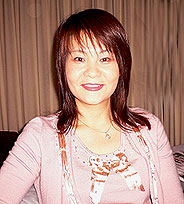 Shumei
Hou (
Shumei
Hou ( To
address this the Centre for Asia Pacific Social Transformation Studies
(CAPSTRANS) at the University of Wollongong, with the support of the
Asia-Pacific Futures Research Network (APFRN), is holding a workshop
on 25 September and 26 September 2006 to be led by four leading Internet
experts working on Asia/Pacific issues. CAPSTRANS is calling for applications
from PhD students and early career researchers at Australian universities
to participate in the workshop. Participants will be asked to submit
a 4000-word paper. For more information on how to apply, contact Mark
McLelland (
To
address this the Centre for Asia Pacific Social Transformation Studies
(CAPSTRANS) at the University of Wollongong, with the support of the
Asia-Pacific Futures Research Network (APFRN), is holding a workshop
on 25 September and 26 September 2006 to be led by four leading Internet
experts working on Asia/Pacific issues. CAPSTRANS is calling for applications
from PhD students and early career researchers at Australian universities
to participate in the workshop. Participants will be asked to submit
a 4000-word paper. For more information on how to apply, contact Mark
McLelland (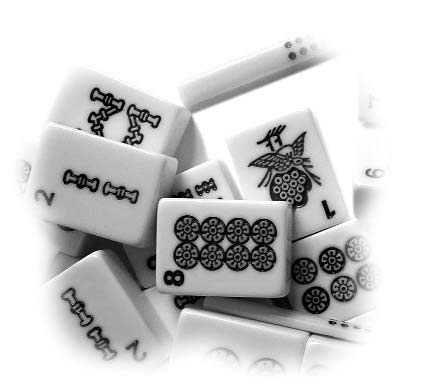 16TH
BIENNIAL CONFERENCE OF THE ASIAN STUDIES ASSOCIATION OF AUSTRALIA (ASAA)
ON “ASIA RECONSTRUCTED”, 26-29 June, 2006, University of
Wollongong.
16TH
BIENNIAL CONFERENCE OF THE ASIAN STUDIES ASSOCIATION OF AUSTRALIA (ASAA)
ON “ASIA RECONSTRUCTED”, 26-29 June, 2006, University of
Wollongong.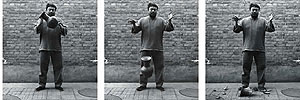 ASIA-PACIFIC
TRIENNIAL OF CONTEMPORARY ART, December 2006, Brisbane. The
Asia-Pacific Triennial of Contemporary Art (APT) will be the opening
exhibition at the new Queensland Gallery of Modern Art. APT 2006 will
present the work of over 30 artists from Asia, Australia and the Pacific.
It will feature a performance and cinema program, as well as a children’s
festival. See
ASIA-PACIFIC
TRIENNIAL OF CONTEMPORARY ART, December 2006, Brisbane. The
Asia-Pacific Triennial of Contemporary Art (APT) will be the opening
exhibition at the new Queensland Gallery of Modern Art. APT 2006 will
present the work of over 30 artists from Asia, Australia and the Pacific.
It will feature a performance and cinema program, as well as a children’s
festival. See 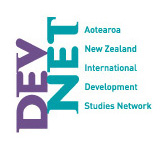 THE
AOTEAROA NEW ZEALAND INTERNATIONAL DEVELOPMENT STUDIES NETWORK CONFERENCE
30 November to 2 December 2006, Dunedin. The conference is
entitled ‘Southern Perspectives on Development: Dialogue or Division?’
is to be held at the University of Otago, Further information is available
from
THE
AOTEAROA NEW ZEALAND INTERNATIONAL DEVELOPMENT STUDIES NETWORK CONFERENCE
30 November to 2 December 2006, Dunedin. The conference is
entitled ‘Southern Perspectives on Development: Dialogue or Division?’
is to be held at the University of Otago, Further information is available
from